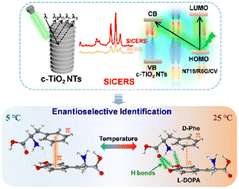Structure-regulated enhanced Raman scattering on a semiconductor to study temperature-influenced enantioselective identification†
Abstract
Surface-enhanced Raman scattering (SERS) spectroscopy is an effective technique that can reveal molecular structure and molecular interaction details. Semiconductor-based SERS platforms exhibit multifaceted tunability and unique selectivity to target molecules as well as high spectral reproducibility. However, the detection sensitivity of semiconductors is impeded by inferior SERS enhancement. Herein, a surface and interference co-enhanced Raman scattering (SICERS) platform based on corrugated TiO2 nanotube arrays (c-TiO2 NTs) was developed, and the coupling of structural regulation and photo-induced charge transfer (PICT) effectively optimized the SERS performance of the semiconductor substrate. Due to the regularly oscillating optical properties of the c-TiO2 NTs, well-defined interference patterns were generated and the local electric field was significantly increased, which greatly promoted both the electromagnetic mechanism and PICT processes. The c-TiO2 NTs were subsequently applied as a highly sensitive SICERS substrate to investigate the mechanism of temperature influence on enantioselective identification. This identification process is related to the existence of temperature-sensitive hydrogen bonds and π–π interaction. This work demonstrates a simply prepared, low-cost, and sensitive SERS substrate that enables better investigation into molecular identification.



 Please wait while we load your content...
Please wait while we load your content...